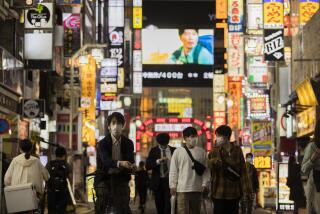Japanese Vacations to Average Just 7 Days
- Share via
TOKYO — Shunichi Inazuka is one of the lucky Japanese workers: This month he is taking a 16-day summer vacation, more than twice the national average.
Inazuka, 42, works for the camera maker Canon, one of Japan’s most generous companies when it comes to vacations.
Canon gives its staff 16 days off, but the average summer holiday for Japanese workers this year will be only 7.4 days, even less for those who work for smaller companies.
By contrast, the average Frenchman and the average Italian is enjoying four weeks of paid leave this summer.
“Summer vacation? That’s a new idea to people of my generation,” said 65-year-old Hiroshi Suzuki, who retired after 30 years at a printing company and now works as a building superintendent.
“For us, July and August were just working months like any other, with a three-day break for Obon,” he said.
Obon, in mid-August, is when Japanese traditionally return to their home town to pay respect to their ancestors.
Short summer vacations are the legacy of Japan’s colossal effort to rebuild the nation following its devastation at the end of World War II--and the work culture that effort spawned.
Japanese culture extols work and has no mercy for the idle or unemployed. It has produced an employment system in which most people work their whole life in the same firm, making it difficult to behave differently from one’s colleagues.
While big business has misgivings about granting longer paid holidays, fearing it might reduce employees’ company loyalty, the government is pressing for shorter working hours and more time off, saying Japanese workers deserve a more enjoyable life.
Prime Minister Kiichi Miyazawa, setting an example, planned to take a total of 20 days off by late August.
More to Read
Inside the business of entertainment
The Wide Shot brings you news, analysis and insights on everything from streaming wars to production — and what it all means for the future.
You may occasionally receive promotional content from the Los Angeles Times.










